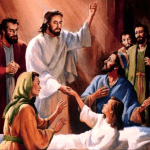 (H/T Alison Killilea and Steven Kelley, Flickr Creative Commons)
(H/T Alison Killilea and Steven Kelley, Flickr Creative Commons)
I didn’t blog much last week.
In fact, I don’t think I wrote a single post.
It wasn’t planned. One unexpected thing led to another and before I knew it, the week was gone. But I have to confess: I enjoyed the break.
It was nice to step away from the craziness of the Internet for a few days. I wasn’t completely gone from the online world. I kept up with Facebook a little bit and Instagrammed the obligatory pictures of the ribs I made last Friday, but that was about it and it was nice.
As so often happens in moments like that, stepping away offered me a bit of perspective. In this case, perspective on the obvious.
There are two radically different perspectives on the current state of the Church.
Depending on who you ask, the Church is either a complete and total disaster or a beautiful source of hope and healing. Sure, there a few people kind of sort of in between, but not many. If the comments and posts I see online and the conversations I hear in the halls of my church are any indication (and I think they are), then the Church is sharply divided by two camps with two polar opposite views of the Church.
On one side are those convinced that the Church is a total disaster that needs to completely demolished and done away with. Perhaps they’ve been seriously hurt by the church – either spiritually or physically or both. Or maybe they haven’t been hurt directly, but are pained instead by a seemingly never ending stream of news stories revealing sexual abuse, financial chicanery, manipulative leadership, institutional coverup, and a whole host of other ecclesiastical sins. And so to many of these folks it seems better to burn the whole thing down because the Church appears hopelessly lost in corruption and abuse. In either case, it’s hard for many in this camp to see much of anything of value remaining in today’s Church.
On the other side are the eternal optimists who see a beautiful wellspring of love, hope, community, and healing. They haven’t experienced the Church-induced pain of their brothers and sisters and thus are left bewildered and frustrated by what seems to them to be petty, unfair, and ungracious criticism of the Church they adore. Where some are quick to condemn the Church’s many sins, these folks are just as quick to point to a worldwide body of believers dedicated to feeding the hungry, caring for the sick, loving the orphaned, and bringing salvation to the lost. Surrounding by such goodness it’s hard to criticize and even harder to listen to criticism of a thing you love so much.
There is love for the Church on both sides of aisle, but there is also a holy and impassioned intransigence that leaves both sides blind to what the other sees so clearly. And so each camp ends up spending nearly as much time condemning the other as they do furthering their righteous cause.
Personally, I find myself on both sides of the aisle at various times, but I’m also deeply frustrated by both camps.
Blind devotion to an institution – no matter how wonderful your personal experience has been within it – is a dangerous and unholy thing. I get the deep and abiding love so many have for the Church. If I didn’t share it, I would not have spent years in full-time ministry. But condemning those who speak out, hiding the Church’s sins, and wrapping ourselves in a cocoon of positivity in hopes of shutting out and shutting down the Church’s critics is not the way of God’s people. We are a people of the Bible and that Story is one of radical transparency and unflinching accountability that never hesitates to acknowledge sin and always puts the needs of people before the prestige of an institution and its leaders.
Likewise, unbridled criticism with no real goal in mind is ultimately unhelpful. That’s not to say that in order to offer criticism one must first have a detailed plan for reform in mind. You don’t. And pretending otherwise only ever serves to silence dissidence. However, I worry that criticism and holy condemnation have too often become ends in themselves. The Church needs prophets, people willing to speak the truth no matter how painful it might be to hear. But the Church needs prophets who are also willing to participate in doing the hard work of reconciliation and restoration. Without that ultimate goal of redemption, there is nothing prophetic about our criticism and condemnation of ecclesiastical sin.
Now, it would be easy, and incredibly tempting, to simply choose a side and say these folks are right and the others are just troublemakers or enablers.
But the truth is, the Church today is a bit of both.
At times the Church is a total and complete disaster that seems more interested in its image, than its people.
But many other times, the Church is a very real beacon of hope in the world to countless millions in need.
We can’t bury our heads in the sand and pretend like there aren’t deep, serious issues plaguing the Church – even if those problems aren’t as evident in our local Church. But we also can’t act as if everything about the Church is terrible and should be done away with because that simply isn’t true.
We need to recognize and acknowledge the validity of both perspectives. We should hold the Church accountable when she stumbles and celebrate when she incarnates the gospel. Because it’s only when we’re honest about who we are – both good and bad – that we have hope for moving forward and becoming a better people, a better Church.
Don’t hear me wrong. Acknowledgment isn’t a ecclesiastical cure-all. But it is a critical first step and an important foundation for moving forward because acknowledging both sides of our present reality not only reminds us of what we are capable of and who we are called to be, it also calls us to transparency while continually holding us accountable when we sin.
I also don’t want you to hear me saying that Church is or should be a beautiful disaster. It is not and should not be for there is no beauty in the Church’s sins. Unfortunately, today it is at once both, a walking contradiction. But we must seek to be one and not the other. We must strive for only beauty even as we acknowledge our sins. Acknowledging the contradiction doesn’t sanctify those sins, rather it should hold us accountable for them in light of who we are called and who we profess to be.
At the end of the day, there are good people who think the Church is a wonderful, life-giving community and there are good people who have been deeply hurt and are deeply disturbed by the way the Church responds (or doesn’t) to its sins.
And both love the Church.
But until both sides acknowledge validity of the other, the Church will never find the healing she needs.
Until both sides acknowledge the validity of the other, the Church will never be able to offer the healing the world needs.
Until both sides acknowledge the validity of the other, the Church can never be everything she’s called to be.












